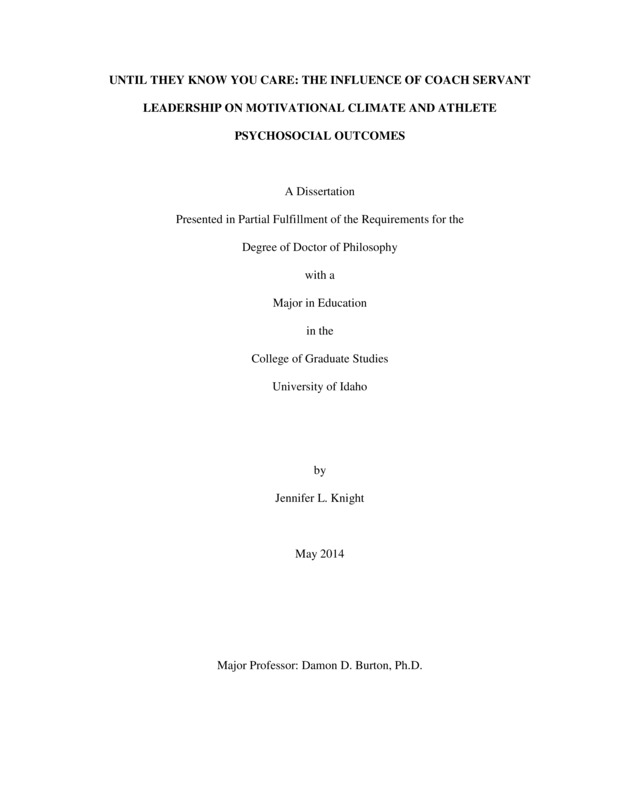Until they know you care: The influence of coach servant leadership on motivational climate and athlete psychosocial outcomes
Knight, Jennifer. (2014). Until they know you care: The influence of coach servant leadership on motivational climate and athlete psychosocial outcomes. Theses and Dissertations Collection, University of Idaho Library Digital Collections. https://www.lib.uidaho.edu/digital/etd/items/knight_idaho_0089e_10162.html
- Title:
- Until they know you care: The influence of coach servant leadership on motivational climate and athlete psychosocial outcomes
- Author:
- Knight, Jennifer
- Date:
- 2014
- Keywords:
- athlete psychosocial outcomes coaching motivational climate servant leadership
- Program:
- Movement & Leisure Sciences
- Subject Category:
- Kinesiology; Psychology
- Abstract:
-
The purpose of this investigation was to examine the relationship among coach leadership factors, perceived motivational climate, and athlete psychosocial outcomes. Servant leadership is a concept growing in interest and popularity in many domains (Anderson, 2005; Drury, 2004; Rieke, Hammermeister, & Chase, 2008). This research examined the impact of coach servant leadership on perceived motivational climate and athlete psychosocial outcomes among 260 female high school club soccer players. Coaches and athletes assessed coach servant leadership using the RSLP-S (Hammermeister et al., 2008). Athletes answered surveys on perceived motivational climate and a range of psychosocial outcomes, including ability to cope with stress, sport confidence, ability beliefs, intrinsic motivation, motivational orientations, trait anxiety, and individual and team satisfaction. Hierarchical Linear Models were set up to test individual hypotheses. Findings revealed that coaches' servant leadership perceptions differed for coaches and athletes. As a result, coach-perceived servant leadership did not predict increments in motivation climate or athlete psychosocial outcomes. However, the athlete-perceived coach servant leadership enhanced prediction efficiency for perceived mastery climate and most of the positive psychosocial outcomes. While the addition of athlete-perceived servant leadership predicted increments in mastery climate in the HLM model, only the trust/inclusion subscale was significant. If athletes perceive a coach as trustworthy and inclusive, they were more likely to perceive a mastery climate. Additionally, coaches who were older and had higher license levels within US Youth Soccer created a stronger mastery climate. The discrepancy between athlete and coach perceptions is consistent with research in social psychology (Harms and Crede, 2010) and sport (Smith & Smoll, 1999) where leaders such as coaches seem to be inaccurate judges of their own behaviors. Thus, these findings suggest that it may be important for coaches of this age group to find ways to develop perceptions of trust and inclusion among their athletes.
- Description:
- doctoral, Ph.D., Movement & Leisure Sciences -- University of Idaho - College of Graduate Studies, 2014
- Major Professor:
- Burton, Damon D
- Committee:
- Stoll, Sharon; Hopper, Brian; Barnes, Justin
- Defense Date:
- 2014
- Identifier:
- Knight_idaho_0089E_10162
- Type:
- Text
- Format Original:
- Format:
- application/pdf
- Rights:
- In Copyright - Educational Use Permitted. For more information, please contact University of Idaho Library Special Collections and Archives Department at libspec@uidaho.edu.
- Standardized Rights:
- http://rightsstatements.org/vocab/InC-EDU/1.0/

